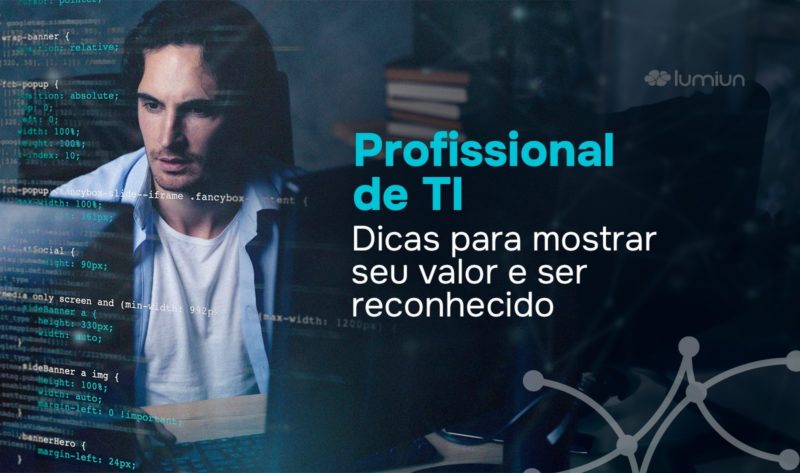Information technology acts as the heart of modern companies. IT professionals are responsible for ensuring the constant efficiency, safety and innovation of digital processes, becoming crucial to the success of an organization. For this reason, it is necessary to adopt strategies to show its value and be recognized as a IT professional.
Being a IT professional , especially with the growing need for cybersecurity , can be a real challenge. Many actions, being part of the routine, end up unnoticed by other departments. Moreover, the fact that it is a highly technical work makes it difficult to understand those who have no knowledge in the area.
According to a survey conducted by Check Point Research , a Check Point Software Intelligence Sector, a 30% increase in cyber attacks worldwide was found, when compared to 2023. Thus, considering this data, we have prepared this article with seven practical tips so that those who are cybersecurity experts can highlight, demonstrate their value and obtain the recognition they deserve.
1. Know the needs of the business
The first step to stand out as a IT professional is to deeply understand the needs of the business in which you are inserted. This means knowing the company's goals , the challenges faced and the opportunities. In this sense, it is not enough just to have a domain of the tools and technologies used; It is essential to understand how IT can be a strategic ally for company growth.
Knowing the company's goals allows you to align your IT activities and projects according to these guidelines, to directly support the largest of the organization. For example, if the company's main focus is digital expansion , you can work on implementing measures to ensure the safety of new processes. That is, knowing the needs of the business also facilitates dialogue with other sectors. By being able to dialogue and exchange information transparently with managers and demonstrate that it can contribute to the growth and success of the company, you increase its relevance and recognition.
Strategic alignment
Understanding the objectives of the organization is paramount to align its activities in the IT sector. cybersecurity professionals who need to ensure that solutions deliver protection to the company without compromising the flexibility or innovation needed for their growth.
Attending meetings with leaders and other departments is a great opportunity to better understand the needs of each sector and align IT strategies with the challenges and opportunities faced. Thus, direct involvement in discussions about business goals demonstrates that IT is an integral part of the organization's success.
In addition, this closer approach allows you to create the opportunity to anticipate possible safety needs. An example of this is the cyber attacks that has been taking place since last week, when platform X has been suspended in the country. Bodies such as the Federal Supreme Court, the Federal Police and Anatel were targeted by massive attacks as reprisal.
Having a good understanding of the organization's strategic goals will allow you to offer preventive solutions rather than reactive, bringing greater visibility to your work and, consequently, more recognition.
Translate needs into security actions
To stand out as a cybersecurity , it is essential to transform business needs into concrete safety actions . For this, it is necessary to understand the challenges that the company faces and offer solutions that bring greater protection to digital assets without prejudice to operational flow. If your business is migrating to a new digital platform , for example, the IT professional's function is to ensure that this transition occurs safely and quietly, minimizing risks and vulnerabilities.
A practical approach is to use your technical knowledge to implement custom and scalable safety solutions . Therefore, instead of offering generic solutions, adapt tools and protocols according to the organization's environment and goals. This personalization shows that you not only understand technology, but it is also committed to the company's success.
Bringing concrete examples to your activity is essential to reinforce its value. If the company's focus is digital expansion, implemented robust measures to protect data from new customers, anticipate possible attacks and create a safer digital environment. Aligning your actions with the company's goals, you make your role more visible and valued.
2. Stay up to date with IT trends
We know that the IT area is constantly evolving, with new technologies adding value and increasing the need to combat threats that arise every day. For this reason, keeping up to date with industry trends is essential to stand out and ensure that your solutions are always ahead of challenges. A IT professional who dominates technological innovations are more likely to be recognized as a valuable asset of the organization.
Staying updated with new technologies also allows you to adopt and evaluate the best tools to adapt to your business reality. Technologies such as artificial intelligence focused on threat detection, process automation, and advanced encryption are just a few examples of what can be added to bring more security and value to your solutions.
It is also necessary to track relevant certifications and training for your area. This demonstrates that you are committed to excellence and continuous improvement of company processes. Always participate in conferences from the technology and workshops industry to acquire new knowledge and expand your contact network.
New threats and emerging technologies
The scenario of cybersecurity is constantly evolving, with different threats arising every day. According to Checkpoint Research , 1,636 cyber attacks per week in the second quarter of 2024 took place. From ransomware to zero-day vulnerabilities , cyber criminals become increasingly sophisticated. Thus, to ensure the security of the company, it is essential that you, as a IT professional, always be aware of the trends and threats that arise. For this, it is essential to follow the latest news and studies in the area, and perform continuous training to always keep up to date.
The advancement of technology contributes to the emergence of new opportunities to protect company systems. Innovative solutions that use artificial intelligence to detect threats have brought a true revolution to the way cybersecurity is currently addressed. Artificial intelligence can monitor systems behavior, identify real -time anomalies, enabling an immediate and more effective response to attacks. The adoption of these emerging technologies not only improves security but also demonstrates its commitment to the innovation and modernity of the company.
In addition to cyber threats and new protection technologies, the growth of the Internet of Things , and the popularization of cryptocurrencies have brought new challenges to the safety strategy. Thus, often poorly protected devices and objects end up becoming vulnerability points and input doors for the invaders. Similarly, the use of cryptocurrencies in ransomware attacks makes it difficult to track criminals. That is, staying ahead of these changes and understanding their implications is critical to developing more complete and effective security strategies.
Investment in Certification and Education
For an IT professional, technical knowledge represents the main asset. However, in a rapidly evolving field, it is indispensable to invest in certifications and education to stay competitive. Certifications in the areas of cybersecurity, data analysis and network management are an intelligent way to validate their skills and demonstrate their commitment to professional growth.
Investing in education is not limited to formal certifications. Conferences , workshops , and webinars are excellent ways to learn from the industry's leading experts and update themselves about best practices and technologies. Thus, participation in industry events is a way to get practical and valuable insights that can be applied immediately to its function, and strengthen your networking . All of this helps to increase your visibility and add value within the company.
Relevant certifications such as Ethical Hacking , Security Operation Center and Risk Management are highly valued in the cybersecurity market. To rely on these credentials prove that you have the knowledge necessary to maintain the protection of the IT system against increasingly sophisticated threats. By continually investing in your training, you improve your skills and open new career opportunities, increasing its importance within the company.
3. Offer proactive solutions
Proactivity , and in the IT sector is no different. Knowing how to identify vulnerabilities before they can be explored by cyber criminals and proposing continuous improvement helps you demonstrate that you are always one step ahead. Performing regular audits in the company's systems in search of failures is an example of how to act proactively.
Developing an incident response plan is equally important. That is, establishing a well -structured plan ensures that the company is prepared to deal with threats, reducing the impact of an attack and demonstrating the importance of its work. These measures reinforce their position as a strategic professional within the organization.
In addition, proposing improvements in security processes, justifying their suggestions with consolidated data , shows that their proposals are based on real analyzes and examples. Using companies that have suffered attacks as an example can help convince leadership to invest in their ideas.
Risk anticipation
Anticipating risks is a critical skill for IT professionals, especially in cybersecurity. The ability to predict possible threats and vulnerabilities before real problems can help the company avoid major damage and ensure continuity of its activities. Thus, the implementation of a proactive approach includes security audits , detailed infrastructure analysis and process evaluation. Audits allow the IT professional to identify and correct weaknesses in the system before cyber criminals explore them.
Another essential tool for anticipating risks is constant monitoring of the digital environment. Implementing real -time monitoring solutions allows you to identify anomalous or suspect behavior and act immediately to neutralize threats. For this, it is necessary to implement intrusion detection software and access log follow -up , which help identify unusual activities and facilitating rapid reaction.
In addition, anticipating risks should be an integral part of the company's long -term strategic planning. That is, it is essential to predict as new technologies, regulations and trends can affect the digital security of the organization. The growing migration to the cloud environment, for example, requires a new security approach that should be evaluated and implemented to avoid future problems. Anticipating these movements and suggesting preventive solutions will help IT professional demonstrate their value as a strategic piece for the company.
IMPROVEMENT PROPOSAL
Proposing continuous improvements is an effective way to add value to your role as an IT professional within the company, demonstrating your commitment to the constant improvement of the technological infrastructure. Instead of awaiting problems, adopt a proactive stance by suggesting improvements that help prevent vulnerabilities and optimize processes. Evaluate and identify areas or deficiencies that can be increased or where there is a need to strengthen security, proposing solutions that address these issues directly and effectively.
Process automation , for example, is a useful approach that can reduce manual workload and minimize human errors, bringing greater operational efficiency. Therefore, propose the implementation of tools that help automate repetitive tasks, such as application of safety patches , network monitoring and backup management . These enhancements will save time and ensure the most accurate realization of critical processes.
Its proposals need to be justified based on consolidated data and concrete examples , ensuring leadership support. Use performance metrics , case studies and compare with other companies in the same sector to highlight how their suggestions can generate positive results. Provide solid evidence to reinforce the importance of your proposals and increase the likelihood of implementation.
4. Implement DNS Filtering Tools
An important tip for improving the security of the company quickly and quickly is to implement DNS filtering tools . This technology allows to block access to malicious websites and significantly reduces the risk of cyber attack. In addition to contributing to the improvement of safety, DNS filtration also helps keep employees focused on their activities by blocking websites and pages that are not related to work.
The adoption of a solution like Lumiun DNS , for example, can be efficient and quite simple. Setting the steps well for implementation, from configuration to monitoring, you can present visible results in a short time. Thus, your company will see an immediate reduction in threats and an increase in employee productivity, adding even more value to their role within the organization.
Delivering concrete results is an excellent way to demonstrate the value of security initiatives you proposed, especially when compared to previous metrics. In addition to strengthening the perception that IT is directly contributing to the company's success.
Benefits of a DNS filtering solution
Implementing a DNS filtering can add several significant benefits to the operational efficiency and cyber security of a company. DNS filtration acts as an additional defense line that blocks access to malicious sites and domains known for being sources of attacks and threats. Based on this, it significantly reduces the risk of malware infections and phishing , protecting data and systems integrity. The ability to intercept and filter suspicious traffic before it reaches devices is a key preventive measure to maintain the company's safety.
DNS filtration contributes to improving employee productivity. Thus, blocking access to work -related websites helps keep employees focused on their tasks, avoiding distractions and access to content that may undermine productivity. In addition to improving the overall performance of the team, this also reduces the time spent on non -productive activities during working hours.
DNS filtering solution can generate significant economies for companies. By preventing data attacks and leaks, it reduces the expenses associated with incident remediation and the loss of valuable information. In addition, DNS filtering also minimizes the need for additional technical support and frequent maintenance, resulting in a general reduction in the organization's operating costs.
Implementation of Lumiun DNS
Implementation of Lumiun DNS in the company is an important strategic step in improving safety and productivity. Lumiun Lumiun DNS is an advanced DNS filtering solution that offers robust protection against cyber threats and improves operational efficiency. The implementation process begins with a detailed evaluation of the needs of the company and the existing infrastructure, so that the solution is personalized and adjusts perfectly to the IT environment.
Then the Lumiun DNS for traffic filtering on the Internet and blocking access to websites and domains known to be malicious. For this, it is essential to integrate the solution with the network system and configure the specific rules that meet the company's security policies. Performing initial tests to ensure that the solution is working properly is crucial, especially to avoid negative impacts on services. Performing training for employees is equally fundamental to ensure a soft transition and the understanding of new protocols.
Some Lumiun DNS numbers
With the correct implementation, the results of Lumiun DNS are quite positive. In 2024 alone, more than 4.7 billion requests were filtered, 523 million being blocked. In addition to the significant reduction in the number of security incidents, such as phishing and malicious access attempts, employee productivity also improves.
Blocking work -related content reduces the incidence of distractions and access to irrelevant pages. Were activated on platform 28,436 filters, with the main 10 being:
- Basic protection
- BLOCK OF CHILD ABUSE CONTENTS
- Adult content block
- Bing Safesearch
- Block bets and gambling sites
- Piracy blockade
- Adblock - Block ads and trackers
- Google Safesearch
- Parked domain blockade
- Free Fire
Based on user performance and feedback metrics, Lumiun DNS not only reinforces safety but also contributes to a more efficient and focused work environment. Thus, we can understand the importance of investing in DNS filtering solutions with a proactive approach to safety.
5. Communicate assertively
IT professional 's work is often because the implemented solutions are too much techniques so that other sectors can understand their role. Thus, knowing how to communicate effectively is fundamental to ensure the recognition of their work , so that everyone understands the importance of their actions and their role within the organization. One way to adopt more effective communication is by translating technical and complex terms into a more affordable language. Thus, all sectors can understand the impact that the tasks performed by the IT industry have on the routine and continuity of the business.
Translation of Technical Terms
In the TI field, clear communication is essential for all stakeholders to understand the importance of safety actions and solutions implemented. The translation of technical terms in a more accessible language for non -expert is a fundamental ability for IT professionals who seek to stand out and be recognized within the company. In addition to facilitating understanding, this approach also creates a narrower alignment between teams and other areas of the company .
An effective approach is to simplify technical terms without losing accuracy . By exemplifying a concept like firewall , for example, it can be described as a protective barrier that prevents unauthorized users from accessing important company information. The use of analogies or comparisons with everyday situations helps make these concepts even more understandable.
The elaboration of executive reports also helps in translating technical terms. Create documents that highlight the results and implications of IT actions with clearer and more objective language, including graphics and summaries that offer an overload without overloading the reader with technical details. Thus, leadership and other stakeholders can understand the value of IT initiatives and support their strategies more effectively.
Presentation of Results
The elaboration of clear and concise executive reports is also critical. Show how IT industry actions protect the company and add value to the business, highlighting the concrete benefits of their initiatives . Thus, metrics can be used to illustrate the reduction of insecurity incidents , for example, and even increased productivity after implementing a new tool .
Show how security initiatives not only protect but also transform the results of the company. It is important that employees and teams understand that what is done in the technology sector is not only for safety, but also for the growth of the organization .
6. Build a network of relationships
Building a network of relationships is critical both inside and outside the company. The IT professional , in addition to having technical knowledge, needs to increase their visibility and recognition through their role and ability. Collaborating with other areas and participating in internal strategic discussions can also help align expectations and ensure that IT is always contributing to the company's objectives.
The better related the IT professional, the better your positioning inside and outside the company . In addition to training, constant communication with other professionals and industry references can make all the difference to add value to their potential.
Internal networking
Internal networking is a fundamental strategy for the success and recognition of IT professional within the organization. Building and maintaining solid relationships with colleagues from different departments will facilitate collaboration and also increase the visibility and influence of your work. That is, integration with other teams helps to better understand the needs and challenges of each area, so that you can offer solutions that really meet specific demands.
In this sense, participation in interdepartal meetings and collaboration in multifunctional projects are excellent strategies to strengthen internal networking. Stay actively engaged in discussions about the initiatives and objectives of other areas, offering technical insights that help improve the overall success of projects . This involvement demonstrates your knowledge and disposition, as well as helping to build a reputation for reliability and proactivity within the company.
That is, when you show interest in operations and teams of other departments, you position yourself as a valuable resource and solution facilitator . Promotion of safety and efficiency within the company is an excellent starting point for building such relationships. Thus, organize training and workshops on safety best practices , sharing knowledge with all your colleagues. In addition to increasing awareness of important issues, this approach also creates opportunities to interact with different parts of the organization.
External networking
Like internal networking, external networking is crucial for professional development and the construction of a IT career. Participation in industry events such as conferences and technology fairs can add value and offer opportunities to connect with leaders, experts and colleagues from other organizations. In addition to expanding your knowledge about market trends and best practices, you will also build a valuable network for future collaborations.
Another tip is to actively engage in discussion groups and online communities aimed at their specialization . Forums, social networking groups and technology communities are great places to share knowledge, discuss solutions and get feedback. Participation in these conversations will increase your visibility in the industry and establish you as a leader , as well as providing access to features and information always updated.
In addition to connecting to other professionals, also consider establishing partnerships with companies and suppliers that offer complementary technologies to yours. This collaboration process will lead to learning opportunities, development of new projects and even strategic partnerships that bring numerous benefits to your organization. The more you expand your external networking, the stronger your position in the market will be and the better your company's continuous success will be, bringing new ideas and perspectives.
7. Demonstrate results with metrics
Thus, data -based decisions are extremely valued in the corporate environment. An effective way to demonstrate your value is to use metrics to demonstrate the impact of your actions within the organization. Performance indicators such as incident response time , compliance with regulatory standards, or number of blocked threats are excellent ways to quantify their results and communicate their true impact on the company's leadership.
Thus, the presentation of these results is regularly essential . Show how the indicators have improved over time and compare the results from before and after the implementation of safety solutions. In addition, use charts, tables and comparisons to illustrate clearly how these initiatives made a difference to the company, helping to protect their assets and ensure business continuity.
Thus, you can also include concrete evidence of how your actions contributed to the blockade of threats and crises . This will not only reinforce the importance of your actions but also to demonstrate how you are constantly working to add value to the organization. Translate technical results and practical benefits to receive recognition and respect from other departments .
Regular reports
Regular reports are essential to maintaining informed leadership on the state of IT operations security. These reports offer a clear and comprehensive view of the activities, results and impacts of the implemented initiatives, allowing management to make informed and strategic decisions. In this sense, elaborate competent and well -structured reports to demonstrate the value of actions and justify investments in new technologies and improvements.
In addition to reporting the results, it is also important to contextualize the data and demonstrate how their initiatives contribute to the company's objectives . That is, explain how the actions performed caused a direct impact on safety, protection and operational efficiency, using examples to illustrate their benefits. Transparency and clarity are fundamental to ensure that leadership can recognize the value of its work and reinforce the strategic role of IT within the organization.
Understand the role of flexibility and adaptability
In the IT scenario, change is a rule. That is, technologies evolve rapidly and new threats come all the time. Thus, demonstrating flexibility and adaptability is essential for the IT professional to be valued within the organization. Understand and find out how to quickly adapt to new situations and learn new tools to differentiate common professionals from exceptional .
Being flexible does not only mean adopting new technologies, but also being able to rethink strategies and processes . Also, if a specific security approach does not bring the expected results, you should be prepared to reassess and adjust your plan. Flexibility also involves collaboration . Teamwork, including listening to suggestions from colleagues and adapting their strategies to meet more appropriate to the needs of departments, are attitudes that promote a culture of constant collaboration and learning . Not only does this improve company results but also solidifies your position as an essential and totally adaptable IT professional .
Join IT Governance
IT governance is critical to ensuring that the technologies used are aligned with the company's objectives and that risks are more effectively managed. Active participation in IT governance will allow the IT professional to have a broader view of the company's strategies and how the sector can support them. In addition to providing opportunities to influence critical decisions that impact safety and operational efficiency, this participation will also highlight it and demonstrate its interest in the success of the business.
Being part of governance means getting involved in strategic planning meetings and providing insights based on your technical expertise. These meetings will help to shape security policies, ensure proper use of investments, and suggest practical improvements for better results. This participation will demonstrate commitment to the general success of the company and reinforce its importance as a team member.
This approach will also allow you to anticipate trends and prepare the company for future changes . This means that your company can be more intelligently prepared for emerging challenges, adaptation to new regulations and even the introduction of new technologies, demonstrating that IT is not only technical support, but also an integral part of the organization's strategic planning.
Invest in your company's security culture
It is important to remember that information security is not an exclusive responsibility of the IT team ; It must be a concern for all employees and departments of the company. Promoting a security culture means that employees are educated about best practices and also aware of the importance of protecting the organization's data.
To add value to your role within the company, start awareness campaigns that make employees more aware of potential threats such as social engineering, phishing and ransomware. Awareness is the first layer of defense against attacks , and the more prepared your employees are, the safer will be your business.
Encourage a security culture to reduce incidents and demonstrate their commitment to the protection of digital assets. Promoting a security culture also includes creating an environment where employees feel comfortable reporting suspicious problems or behaviors . An open communication channel can help prevent incidents before they cause major problems for the organization.
Empowerment of the IT team
Empowering the IT team is an effective strategy for creating a more productive and innovative work environment. In addition to adding value to their role as a professional, when the team feels more valued and trained, performance also improves and more innovative solutions begin to emerge naturally. As an influential member of the IT team, you can encourage everyone's professional development and create opportunities for each one to demonstrate their skills and find their role within the company.
Encouraging participation in conferences and workshops , promoting training and helping your team to obtain certifications are effective ways to empower and develop skills. The more trained your team, the better the result of your work and also the implementation of safety and technology strategies. This will bring recognition to you and the rest of the IT team within the organization.
This process of empowerment also means making room for the exchange of ideas and innovation . The promotion of regular meetings where everyone can share challenges, solutions and strategies is quite effective. This way you will have a collaborative environment where everyone has active voice, strengthening your team and creating a culture of innovation .
Use an approach to various fronts to achieve your goals
The seven tips presented here can help IT professionals stand out in the market and ensure recognition within their organizations . From understanding business needs to being up to date with trends, implementing these strategies is critical to adding value and demonstrating your role in the face of your work.
It is necessary to put these tips into practice and understand that, to stand out in the market, you need to adopt an assertive strategy . Evaluate how you can improve your visibility, productivity and communication so that your work is not only recognized, but also valued within the company you are part. It is also necessary to adopt tools and solutions that deliver quality results to your business, demonstrating how your role is critical to medium and long term business success .











